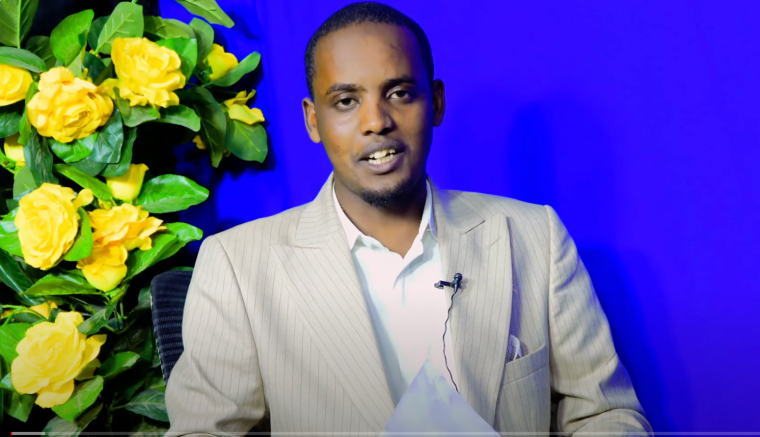Nairobi, March 12, 2024—Authorities in Ethiopia should unconditionally release journalist Muhiyadin Mohamed Abdullahi, who was arrested almost a month ago on February 13, and desist from arbitrarily detaining members of the press, the Committee to Protect Journalists said Tuesday.
Muhiyadin, who publishes reporting and commentary on his Muxiyediin show Facebook page, was arrested by security forces of unknown affiliation from his home in Jigjiga, capital of Ethiopia’s eastern Somali Regional State, according to the Addis Standard independent news website and Abdulrazaq Hassan, chairperson of the Somali Region Journalists Association, a local media rights group.
On March 4, authorities charged Muhiyadin with spreading false news and hate speech, in violation of Ethiopia’s hate speech and disinformation law, according to Abdulrazaq and a copy of the charge sheet reviewed by CPJ. If found guilty, Muhiyadin could face up to five years in prison.
“Officials in Ethiopia’s Somali Regional State should stop wasting public resources on prosecuting a journalist whose only crime was criticizing political elites on Facebook,” said CPJ Africa Program Coordinator Muthoki Mumo. “Authorities should release Muhiyadin immediately and drop the criminal case against him. Ethiopian authorities must bring an end to the culture of locking journalists up whenever they don’t like what they are saying.”
Abdulrazaq told CPJ that security personnel held Muhiyadin at an undisclosed location for six days, without charge or explanation, before transferring him on February 19 to the Fafan Zone police station in Jigjiga.
When Muhiyadin appeared in court on February 20, police alleged that he had disseminated false propaganda and were given 10 days to hold him in custody while they carried out further investigations, Abdulrazak said.
Charged with inciting the public
Muhiyadin’s charge sheet said that he incited the public in a Facebook post on February 12 to “stand up against the non-believer whom they closed the roads for.” It did not provide details as to who the “non-believer” referred to or any image of the Facebook post.
CPJ’s review of Muhiyadin’s Facebook page on March 5 found one post criticizing road closures in Jigjiga on February 11, the day before Ethiopian Prime Minister Abiy Ahmed’s visit. The post said that transport fares had been hiked and the government “should care for the poor members” of society. It did not contain the phrases cited in the charge sheet.
Prior to his arrest, Muhiyadin said on Facebook that he had been threatened for his reporting. On February 2, he said that his coverage would not be “silenced by anyone.” On February 3, he said he planned to leave the Somali Regional State after being threatened by the ruling party and the opposition for criticizing them.
After Muhiyadin’s arrest, a user identifying themselves as the Muxiyediin show’s administrator posted on February 23 that they had met Muhiyadin in prison and he had asked them to continue publishing on the page “to speak for the Somali community.”
Muhiyadin was previously arrested and detained for three days in 2023 after he posted a video on Facebook protesting authorities’ suspension of 15 media outlets in the state, including the U.K.-based broadcaster Kalsan TV, which he was working for as a reporter.
According to the CPJ’s latest annual prison census on December 1, 2023, Ethiopia was the second-worst jailer of journalists in sub-Saharan Africa with eight behind bars. Four of these journalists were detained without charge or trial following the August 4 declaration of a six-month state of emergency in response to conflict in Amhara State.
In February, the state of emergency was extended for four months.
Abdikadir Rashid Duale, head of the Somali Regional State’s communication bureau, which acts as a regional government spokesperson and licenses media outlets, told CPJ via messaging app: “We are deeply sorry about the detention of Mr. Muhiyadin, as he is a citizen with the constitutional right[s] and the human right[s] … but that doesn’t mean that a citizen cannot be questioned about what he/she is doing.”
He referred CPJ’s questions about Muhiyadin’s case to regional security agencies but did not specify which ones.
Ali Abdijabar, a deputy commissioner for police in the Somali Regional State, did not immediately respond to CPJ’s requests for comment via messaging app.
Editor’s note: Shortly after the publication of this alert, deputy police commissioner Ali Abdijabar sent CPJ an undated video in which Muhiyadin was speaking, saying he was “angry and sad” about road closures in Jigjiga during a celebration by “nonbelievers” who are “cursed in the Quran.” The deputy police commissioner did not respond to subsequent messages by CPJ requesting clarification on when and where the video was recorded or published. Abdikadir Awess, a newly-appointed lawyer representing Muhiyadin, told CPJ that authorities had introduced this video as evidence in court. Abdikadir said the journalist did not “incite anyone, and the alleged incitement did not materialize.”
